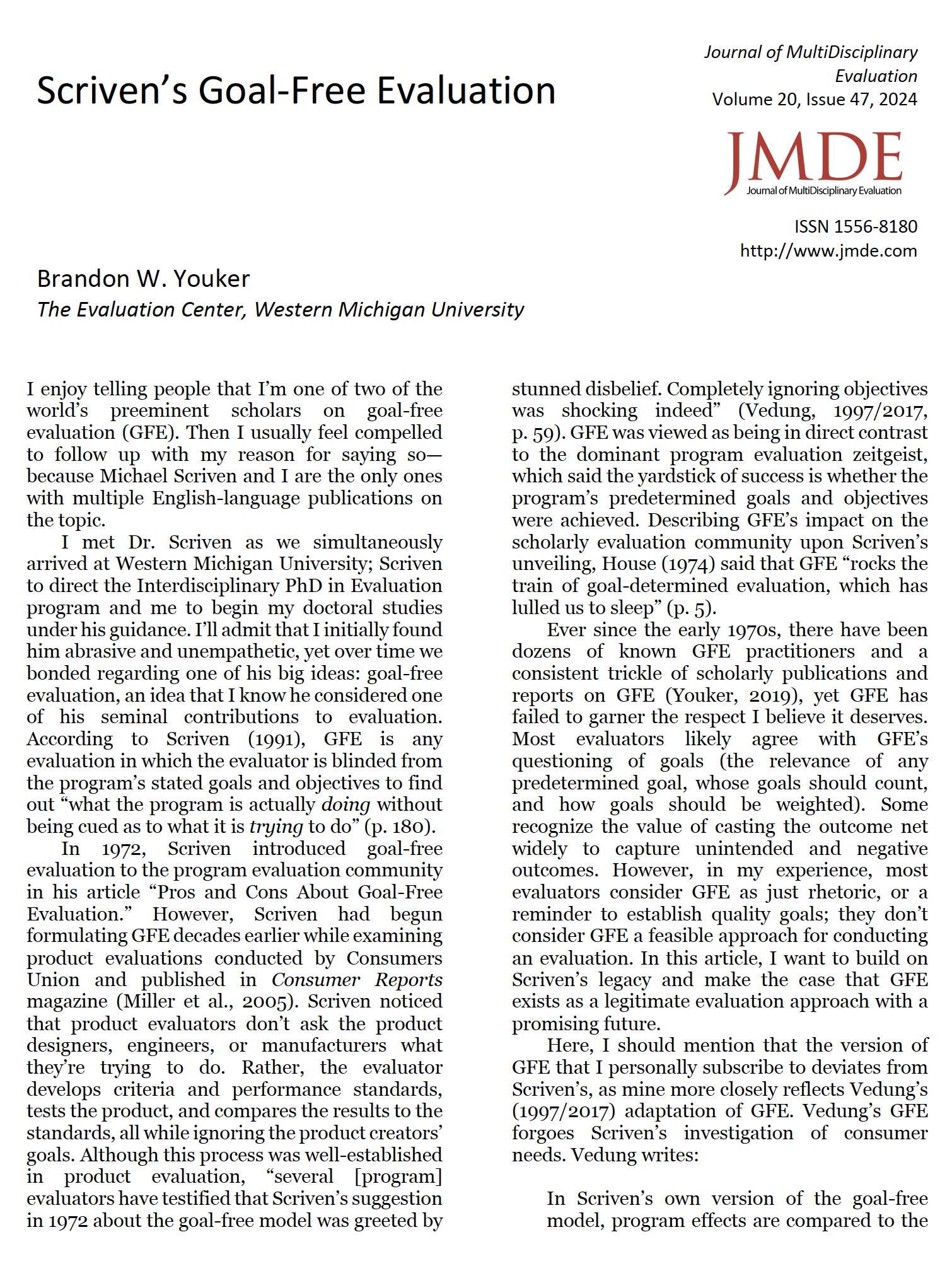Scriven's Goal-Free Evaluation
Main Article Content
Abstract
Youker examines goal-free evaluation's history and importance, advocating for its broader acceptance in program evaluation practice.
Downloads
Article Details

This work is licensed under a Creative Commons Attribution-NonCommercial 4.0 International License.
Copyright and Permissions
Authors retain full copyright for articles published in JMDE. JMDE publishes under a Creative Commons Attribution-NonCommercial 4.0 International License (CC BY - NC 4.0). Users are allowed to copy, distribute, and transmit the work in any medium or format for noncommercial purposes, provided that the original authors and source are credited accurately and appropriately. Only the original authors may distribute the article for commercial or compensatory purposes. To view a copy of this license, visit creativecommons.org
References
Abboud, R., & Claussen, C. (2016). The use of Outcome Harvesting in learning-oriented and collaborative inquiry approaches to evaluation: An example from Calgary, Alberta. Evaluation and Program Planning, 59, 47–54. https://doi.org/10.1016/j.evalprogplan.2016.08.005 DOI: https://doi.org/10.1016/j.evalprogplan.2016.08.005
Chen, A. T. H., Koh, G. C.-H., Fong, N. P., Lim, J. F. Y., & Hildon, Z. J.-L. (2023). Evaluating the effects of capacity building initiatives and primary care networks in Singapore: Outcome harvesting of system changes to chronic disease care delivery. International Journal of Environmental Research and Public Health, 20(3), 2192. https://doi.org/10.3390/ijerph20032192 DOI: https://doi.org/10.3390/ijerph20032192
Dinh, K., Worth, H., & Haire, B. (2019). Buddhist evaluation: Applying a Buddhist world view to the Most Significant Change Technique. Evaluation, 25(4), 477–495. https://doi.org/10.1177/1356389019841654 DOI: https://doi.org/10.1177/1356389019841654
Fink Shapiro, L., Hoey, L., & Colasanti, K. (2021). Stories as indicators: Lessons learned using the Most Significant Change method to evaluate food systems work in Michigan. Journal of Agriculture, Food Systems, and Community Development, 10(2), 1–13. https://doi.org/10.5304/jafscd.2021.102.025 DOI: https://doi.org/10.5304/jafscd.2021.102.025
Henry, E., Walker, M. R., Noble, C. C., Fernandez, C. S. P., Corbie-Smith, G., & Dave, G. (2022). Using a most significant change approach to evaluate learner-centric outcomes of clinical scholars leadership training program. Evaluation and Program Planning, 94, 102141. https://doi.org/10.1016/j.evalprogplan.2022.102141 DOI: https://doi.org/10.1016/j.evalprogplan.2022.102141
House, E. (1974). Confessions of a responsive goal-free evaluator [Unpublished manuscript]. Center for Instructional Research and Curriculum Evaluation, University of Illinois Urbana-Champaign.
Miller R. L., King, J. A., Mark, M. M., & Stockdill, S. H. (2005). The oral history of evaluation, part 3. The American Journal of Evaluation, 26(3), 378–388. https://doi.org/10.1177/1098214005276646 DOI: https://doi.org/10.1177/1098214005276646
Railer, J., Stockley, D., Flynn, L., Hastings‐Truelove, A., & Hussain, A. (2020). Using outcome harvesting: Assessing the efficacy of CBME implementation. Journal of Evaluation in Clinical Practice, 26(4), 1132–1152. https://doi.org/10.1111/jep.13359 DOI: https://doi.org/10.1111/jep.13359
Russell, J. (2023, January 30). More big donors want to be anonymous. Indianapolis Business Journal. https://www.insideindianabusiness.com/articles/more-big-donors-want-to-be-anonymous
Scriven, M. (1972). Pros and cons about goal-free evaluation. Journal of Educational Evaluation, 3(4), 1–7. https://doi.org/10.2307/1174432 DOI: https://doi.org/10.2307/1174432
Scriven, M. (1991). Evaluation thesaurus (4th ed.). Sage.
Vedung, E. (1997/2017). Public policy and program evaluation. Transaction Publishers. https://doi.org/10.4324/9781315127767 DOI: https://doi.org/10.4324/9781315127767
Youker, B. W. (2013). Goal-free evaluation: A potential model for the evaluation of social work programs. Social Work Research, 37(4), 432–438. https://doi.org/10.1093/swr/svt032 DOI: https://doi.org/10.1093/swr/svt032
Youker, B. W. (2019). What, how, and why? A comparative analysis of 12 goal-free evaluations. Journal of MultiDisciplinary Evaluation, 15(33), 16–29. https://doi.org/10.56645/jmde.v15i33.444 DOI: https://doi.org/10.56645/jmde.v15i33.444
Youker, B. W., Ford, K., & Bayer, N. (2017). Dismissing the goals: A comparison of four goal-dismissive goal-free evaluations. Evaluation and Program Planning, 46, 1–6. https://doi.org/10.1016/j.evalprogplan.2017.05.007 DOI: https://doi.org/10.1016/j.evalprogplan.2017.05.007

